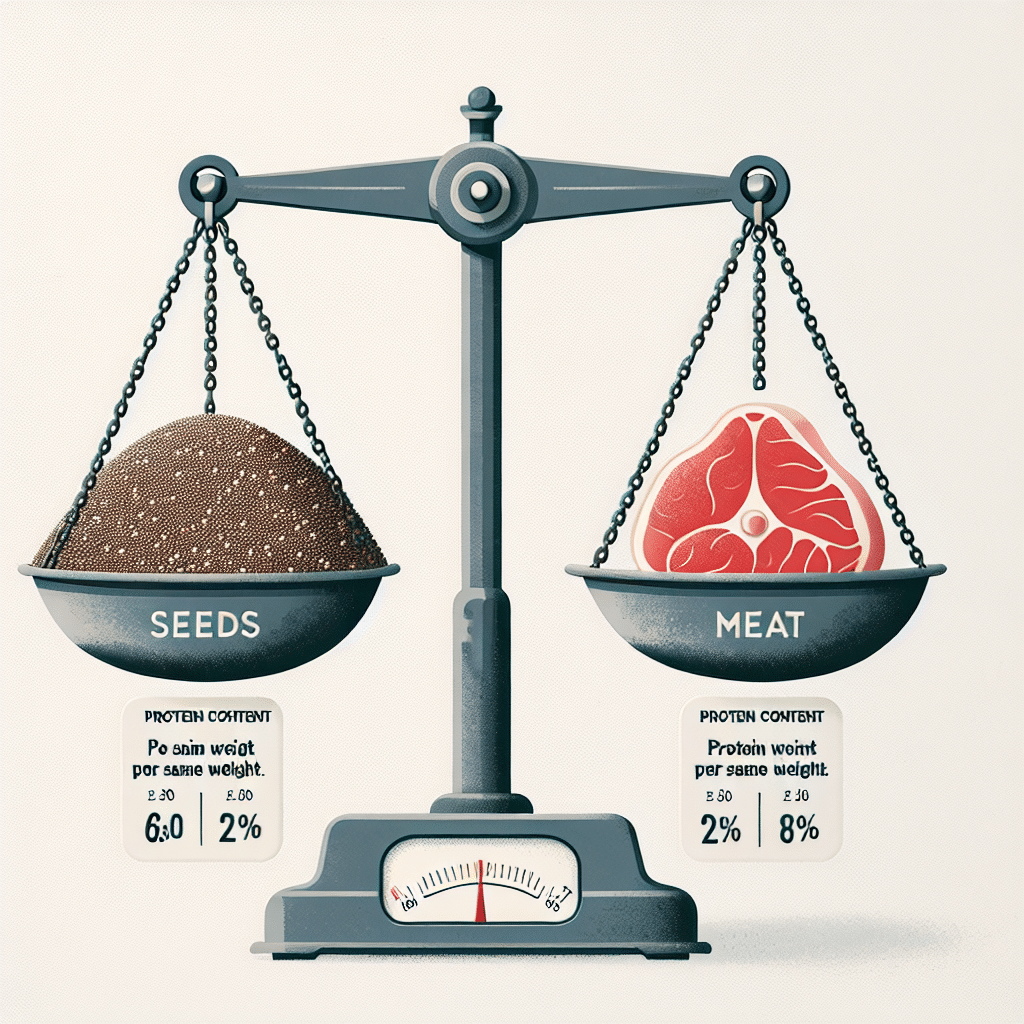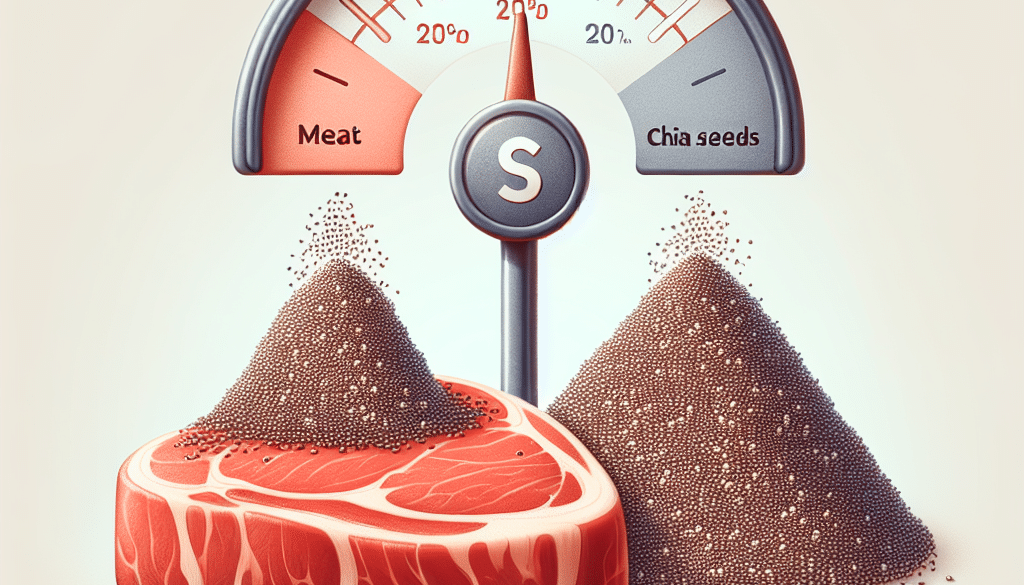Do Chia Seeds Have More Protein Than Meat?
-
Table of Contents
- Chia Seeds vs. Meat: A Protein Comparison
- Understanding Protein in Our Diet
- Chia Seeds: A Nutritional Powerhouse
- Protein Content: Chia Seeds vs. Meat
- Quality of Protein: Amino Acid Profiles
- Health Benefits Beyond Protein
- Environmental and Ethical Considerations
- Incorporating Chia Seeds into Your Diet
- Case Studies and Research
- Conclusion: Balancing Protein Sources
- Discover ETprotein’s Plant-Based Protein Products
Chia Seeds vs. Meat: A Protein Comparison

When it comes to protein sources, meat has traditionally been the go-to option for many. However, with a growing interest in plant-based diets, superfoods like chia seeds have entered the spotlight. This article delves into the protein content of chia seeds compared to meat and explores whether these tiny seeds can hold their own in the protein arena.
Understanding Protein in Our Diet
Protein is a macronutrient essential for building muscle mass, repairing tissues, and producing enzymes and hormones. While meat is known for its high protein content, plant-based sources are gaining popularity for their additional health benefits and sustainability factors.
Chia Seeds: A Nutritional Powerhouse
Chia seeds are small, nutrient-dense seeds that come from the Salvia hispanica plant. They are rich in omega-3 fatty acids, fiber, antioxidants, and, of course, protein. But how does their protein content measure up against meat?
Protein Content: Chia Seeds vs. Meat
When comparing the protein content of chia seeds to meat, it’s important to look at the numbers:
- A 100-gram serving of chia seeds contains approximately 17 grams of protein.
- In contrast, a 100-gram serving of beef contains about 26 grams of protein.
- Chicken breast of the same serving size offers around 31 grams of protein.
While meat provides a higher protein content per 100 grams, chia seeds are still a significant source of plant-based protein. However, it’s not just about the quantity of protein but also the quality.
Quality of Protein: Amino Acid Profiles
Proteins are made up of amino acids, some of which are essential because our bodies cannot produce them. A complete protein source contains all nine essential amino acids in sufficient amounts.
- Most meats are considered complete proteins, containing all essential amino acids.
- Chia seeds also contain all nine essential amino acids, making them a rare complete plant-based protein.
However, the ratio of these amino acids in chia seeds is different from meat, which may affect the protein’s bioavailability and utilization in the body.
Health Benefits Beyond Protein
While meat is a robust source of protein, chia seeds offer additional health benefits:
- They are high in dietary fiber, promoting digestive health.
- Chia seeds are rich in omega-3 fatty acids, which are beneficial for heart health.
- They have a low glycemic index, making them suitable for blood sugar management.
These factors make chia seeds an attractive option for those looking to improve their overall health, not just their protein intake.
Environmental and Ethical Considerations
The production of chia seeds generally has a lower environmental footprint compared to meat. Livestock farming is associated with higher greenhouse gas emissions, land use, and water consumption. Additionally, plant-based proteins are often preferred by those with ethical concerns about animal welfare.
Incorporating Chia Seeds into Your Diet
Chia seeds are versatile and can be easily incorporated into various dishes:
- Add them to smoothies, yogurts, or oatmeal for a protein boost.
- Use chia seeds as an egg substitute in baking by creating a “chia egg.”
- Make chia pudding by soaking the seeds in milk or a dairy-free alternative.
These methods allow you to enjoy the benefits of chia seeds without significantly altering your diet.
Case Studies and Research
Several studies have highlighted the benefits of plant-based proteins. For instance, research published in the “Journal of the American Heart Association” found that higher intake of plant-based proteins was associated with a lower risk of death, especially from cardiovascular diseases.
Another study in the “Nutrients” journal showed that incorporating chia seeds into bread increased the protein quality and fiber content, making it a healthier option than traditional bread.
Conclusion: Balancing Protein Sources
While chia seeds do not contain more protein than meat per serving, they are a complete protein source and offer numerous health benefits. For those looking to diversify their protein intake or follow a plant-based diet, chia seeds are an excellent addition. However, it’s important to maintain a balanced diet that includes a variety of protein sources to meet all nutritional needs.
Discover ETprotein’s Plant-Based Protein Products
If you’re interested in exploring plant-based protein options, ETprotein offers a range of high-quality products. Their selection includes organic rice protein, pea protein, and various seed proteins, all characterized by a neutral taste and non-GMO, allergen-free attributes. With a commitment to sustainability and health, ETprotein’s products are an ideal choice for those seeking to incorporate more plant-based proteins into their diet.
About ETprotein:
ETprotein, a reputable protein and L-(+)-Ergothioneine (EGT) Chinese factory manufacturer and supplier, is renowned for producing, stocking, exporting, and delivering the highest quality organic bulk vegan proteins and L-(+)-Ergothioneine. They include Organic rice protein, clear rice protein, pea protein, clear pea protein, watermelon seed protein, pumpkin seed protein, sunflower seed protein, mung bean protein, peanut protein, and L-(+)-Ergothioneine EGT Pharmaceutical grade, L-(+)-Ergothioneine EGT food grade, L-(+)-Ergothioneine EGT cosmetic grade, L-(+)-Ergothioneine EGT reference grade and L-(+)-Ergothioneine EGT standard. Their offerings, characterized by a neutral taste, non-GMO, allergen-free attributes, with L-(+)-Ergothioneine purity over 98%, 99%, cater to a diverse range of industries. They serve nutraceutical, pharmaceutical, cosmeceutical, veterinary, as well as food and beverage finished product distributors, traders, and manufacturers across Europe, USA, Canada, Australia, Thailand, Japan, Korea, Brazil, and Chile, among others.
ETprotein specialization includes exporting and delivering tailor-made protein powder and finished nutritional supplements. Their extensive product range covers sectors like Food and Beverage, Sports Nutrition, Weight Management, Dietary Supplements, Health and Wellness Products, and Infant Formula, ensuring comprehensive solutions to meet all your protein needs.
As a trusted company by leading global food and beverage brands and Fortune 500 companies, ETprotein reinforces China’s reputation in the global arena. For more information or to sample their products, please contact them and email sales(at)ETprotein.com today.














